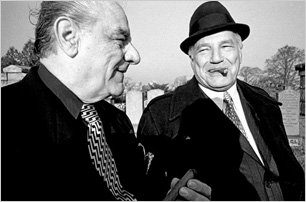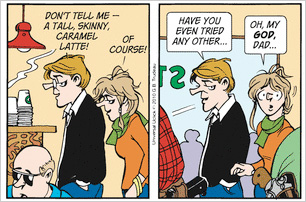
Omega Males and the Women Who Hate ThemThey're unemployed, romantically challenged, and they're everywhere.
Posted Thursday, March 18, 2010, at 9:59 AM ET In the Noah Baumbach movie Greenberg, out in limited release this Friday, the eponymous main character is having trouble being a man. The 41-year-old Greenberg, played by Ben Stiller, tells his 25-year-old love interest that when he was a kid he dreamed of being an astronaut. Now he can't even drive, much less pilot a shuttle. He sabotaged his career as a musician, so he's trying the old-fashioned, manly pursuit of carpentry. He pretends not to care about his new line of work—he tells his friends he's doing "nothing for a while"—yet Greenberg is seriously wounded when an ex-girlfriend tells him she doesn't remember the bed he built for her. All she recalls are his anxiety attacks.
In the Noah Baumbach movie Greenberg, out in limited release this Friday, the eponymous main character is having trouble being a man. The 41-year-old Greenberg, played by Ben Stiller, tells his 25-year-old love interest that when he was a kid he dreamed of being an astronaut. Now he can't even drive, much less pilot a shuttle. He sabotaged his career as a musician, so he's trying the old-fashioned, manly pursuit of carpentry. He pretends not to care about his new line of work—he tells his friends he's doing "nothing for a while"—yet Greenberg is seriously wounded when an ex-girlfriend tells him she doesn't remember the bed he built for her. All she recalls are his anxiety attacks.
Greenberg is pretty much the fictional representation of the masculinity crisis that Susan Faludi outlined in her 1999 book Stiffed: The Betrayal of the American Man. Men like Greenberg, Faludi argued, were led to believe as boys that they were "going to be the master of the universe and all that was in it," that they'd be astronauts conquering the final space frontier or, at the very least, that they would master a lifelong stable job and a healthy family. But by the '90s, Greenberg types found themselves "masters of nothing." The latest recession is only making it more so, as job security becomes a fantasy for many, and marriage rates plummet.
And yet men are still tragically unable to retool. The image of the American woman has gone through several upheavals since the 1950s, but the masculine ideal seems fixed in cultural aspic: Think slick ad executive Don Draper in Mad Men and the WWII heroes in the Tom Hanks-produced HBO series The Pacific. So his confused, paralyzed counterpart is cropping up in ever-more variations on TV and in movies: the omega male.
In the social hierarchy of a wolf pack in captivity, the omega ranks below the alpha and beta wolves. In human terms, if an executive or a warrior is an alpha male and a nice-guy middle manager like The Office's Jim Halpert is a beta male, then Greenberg and his brethren are omega males. While the alpha male wants to dominate and the beta male just wants to get by, the omega male has either opted out or, if he used to try, given up. Greenberg says of his somewhat stunted best friend, "We call each other 'man,' but it's a joke. It's like imitating other people." The omega male is not experiencing the tired trope of the midlife crisis. A midlife crisis implies agency, a man who has the job and the family and chooses to reject it. The omega male doesn't have the power to reject anything—he's the one who has been brushed off. He's generally unemployed, and his romantic relationships are in shambles—he's either single or, if he's married, not happy about it. "I'm doing nothing and I'm tied to no one," Greenberg boasts.
As a seemingly educated guy who travels in culturally elite circles, Greenberg is just one variety of omega male. Here's a taxonomy of the different types you might find skulking across the small and large screens.
 The Liberal Arts Layabout: Since he's hanging out with successful artist types, Greenberg falls into this category, along with other Noah Baumbach characters (Jack Black in Margot at the Wedding, Chris Eigeman in Kicking and Screaming) and every role that Jason Schwartzman has ever played. They are usually failed artists of some sort, often surrounded by more successful friends and relatives. The bitter ones—Greenberg, Chris Eigeman—hide their inability to live up to the demands of the world with cynicism verging on cruelty. For example, after yelling, unprovoked, at his young lover Florence, Greenberg tells her that it's partially her fault and that she should "take some responsibility for trying to see me." The sweeter ones—Jason Schwartzman in Bored to Death—retreat to an elaborate fantasy world. In Bored to Death, Schwartzman plays Jonathan Ames, a writer whose career has stalled. He decides to become an amateur private eye after reading too many pulp novels and is mostly incompetent at his new fake job.
The Liberal Arts Layabout: Since he's hanging out with successful artist types, Greenberg falls into this category, along with other Noah Baumbach characters (Jack Black in Margot at the Wedding, Chris Eigeman in Kicking and Screaming) and every role that Jason Schwartzman has ever played. They are usually failed artists of some sort, often surrounded by more successful friends and relatives. The bitter ones—Greenberg, Chris Eigeman—hide their inability to live up to the demands of the world with cynicism verging on cruelty. For example, after yelling, unprovoked, at his young lover Florence, Greenberg tells her that it's partially her fault and that she should "take some responsibility for trying to see me." The sweeter ones—Jason Schwartzman in Bored to Death—retreat to an elaborate fantasy world. In Bored to Death, Schwartzman plays Jonathan Ames, a writer whose career has stalled. He decides to become an amateur private eye after reading too many pulp novels and is mostly incompetent at his new fake job.
on the Fray
-
Health care bill will require new restaurant menus that include calorie counts http://bit.ly/cd7ZTF
-
Become a fan of Slate on Facebook http://bit.ly/4EGWiY Follow us on Google Buzz http://bit.ly/aanSOz
-
Haliburton withdraws appeal in Jamie Leigh Jones rape case http://bit.ly/dB9Dwh
 Shafer: What Ross Douthat Overlooks About Conspiracy Theorists
Shafer: What Ross Douthat Overlooks About Conspiracy Theorists Why Do Investors Keep Making Bad Bets Against Obama?
Why Do Investors Keep Making Bad Bets Against Obama?  Strange YouTube Trend: The Girls Who Want To Show You the Clothes They Just Bought
Strange YouTube Trend: The Girls Who Want To Show You the Clothes They Just Bought Slate's Sports Experts Size Up the Sweet 16
Slate's Sports Experts Size Up the Sweet 16 Companies Get Paid To Use Less Energy. Why Not Homeowners Like Me?
Companies Get Paid To Use Less Energy. Why Not Homeowners Like Me? Obama's Bold Plan To Fix America's Lousy Internet Connection
Obama's Bold Plan To Fix America's Lousy Internet Connection















